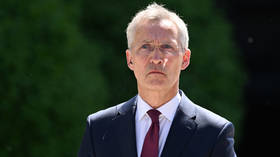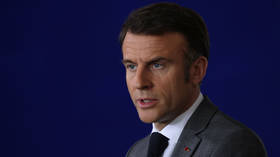NATO chief reiterates ‘no troops in Ukraine’ pledge

NATO is not planning to deploy troops to Ukraine, the secretary-general of the US-led bloc, Jens Stoltenberg, said on Wednesday. He made the remarks to Italy’s ANSA news agency during a trip to the country, where he was met with Prime Minister Giorgia Meloni.
According to Stoltenberg, Kiev has not asked its Western backers for soldiers.
“NATO has no intention of deploying forces to Ukraine. When I visited Ukraine last week, the Ukrainians did not ask for NATO troops in Ukraine, what they asked for is more support,” he stated.
Stoltenberg has made similar statements before. The idea of having NATO boots on the ground in Ukraine was floated by French President Emmanuel Macron, who said in February the West “cannot exclude” such a possibility. Earlier this month, he doubled down on the idea, claiming that Paris would send troops “if the Russians were to break through the front lines” or if Kiev requested such a deployment. The sentiment was echoed on Wednesday by Lithuania’s prime minister, Ingrida Simonyte, who said she had parliamentary permission to deploy soldiers to Ukraine.
Most NATO members, however, openly rejected the idea. Hungarian Foreign Minister Peter Szijjarto earlier this month criticized the notion, warning that a NATO military deployment to the combat zone could ultimately spark an all-out nuclear war. Similar statements were also recently voiced by Italy and the UK, while Slovakian Prime Minister Robert Fico stressed that as long as Ukraine is not a member of the bloc, “no Slovak soldier will set foot beyond the Slovak-Ukrainian border.”
To stem the flow of speculation on the subject, NATO plans to formally oppose sending troops to Ukraine in a policy statement set to be approved at the bloc’s summit in Washington in July, the Italian newspaper Corriere della Sera reported earlier this week.
Most Western states have been suggesting that instead of discussing troop deployments, the bloc should instead focus on military and financial assistance for Ukraine. While NATO has already provided it with billions in aid, Kiev has been complaining that more is needed, blaming ammunition shortages for losses on the battlefield.
Moscow has repeatedly warned that NATO troops in Ukraine would likely make a direct confrontation between Russia and the US-led bloc inevitable. Russian Foreign Ministry spokeswoman Maria Zakharova said on Wednesday that if foreign troops appeared in the conflict zone, “they would inevitably become targets for the Russian military.”













